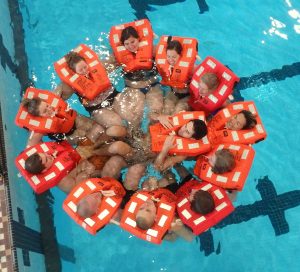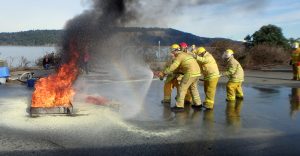Domestic Vessel Safety
Domestic Vessel Safety (formerly MED A1/A2) is a Marine Emergency Duties safety training course for crew of commercial Vessels operating domestically (within Canada), on Sheltered Waters voyages, and Near Coastal Class 2 voyages. On All Commercial Vessels, Specifically: Passenger vessels 15 GT and over and/or carrying more than 12 passenger; Workboats of 15 GT and over; and Fishing Vessels
Description
This is a Marine Emergency Duties safety training course, formerly known as MED A1 / A2
This ticket applies to Masters and Crew
operating domestically (within Canada):
– On Near Coastal Class 2 and Sheltered Waters voyages
– On All Commercial Vessels, Specifically:
- Passenger vessels 15 GT and over and/or carrying more than 12 passenger
- Workboats of 15 GT and over
- Fishing Vessels
This course is a mix of classroom theory and real hands-on scenarios. Over a very full and fun 4 days we will cover theories on:
- Types of Emergencies
- Emergency Procedures
- Vessel Stability
- Life Rafts, Survival Suits, and Lifesaving Appliances
- Life Jackets, PFD’s, Worksuits, Floater Coats
- Fire, Extinguishers, Suppression Systems, and Marine Fire Fighting
- Passenger Control, Safety Briefings, and Passenger Safety
- Safety Regulation and Requirements
- Hypothermia and cold water immersion
We will also conduct 2 hands-on field exercises.
One in a swimming pool where we will:
- launch, board, and use a life raft
- use survival suits, PFD’s, and life jackets
- practice recovering a victim from the water
- use life rings, a rescue quest, parbuckles, Jason’s cradle, and a life sling
The other will be a live fire exercise using real fire. We will:
- use 3 different types of fire extinguishers
- practice working in teams to recover a victim from a burning compartment
- and use a fire hose with a combination nozzle
It is a very fun, practical and essential course for anyone working on the water.
Required Supplies:
- bathing suit
- towel
- boots, or water resistant shoes (recommended)
To work as a Deckhand or Crew you may also need the following: (depending on the type of work, # of passengers, and area of operation)
- ROC-M – Radio Course (Restricted operator Certificate – Maritime)
- SVOP – Small Vessel Captain (Small Vessel Operator Proficiency)
- Marine Basic First Aid – only at St. John’s Ambulance or Red Cross
To operate as a Master Limited 60 GT, you also need:
- Chartwork & Pilotage 1
- Navigation Safety 1
- ROC-M or ROC-MC
- SVOP (only if you are operating small tenders with passengers to/from the primary vessel)
- Marine Basic First Aid – only at St. John’s Ambulance or Red Cross
To operate as a Fishing Master 4, you also need:
- Chartwork & Pilotage 1
- Navigation Safety 1
- Simulated Electronic Navigation – Limited
- Ship Construction & Stability 1
- ROC-MC
- SVOP (only if you are operating small tenders with passengers to/from the primary vessel)
- Marine Advanced First Aid – only at St. John’s Ambulance or Red Cross
To book a course or if you have any questions, feel free to Contact Us.
Prerequisites
As of October 23rd, 2025 Transport Canada now advises seafarers that they must complete an online fatigue management course before enrolling in any Marine Emergency Duties Training. Information can be found here.
- Minimum age requirement: 15 years
